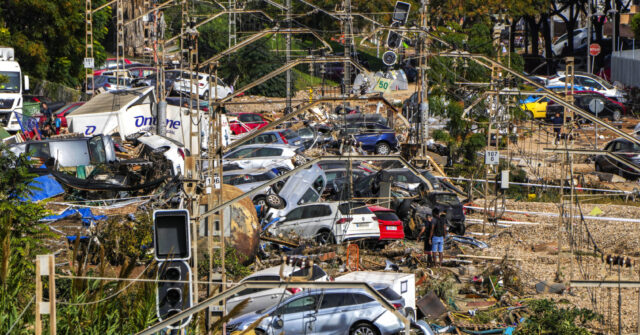In the wake of devastating flash floods that hit southern Valencia, Spain, the aftermath has seen a profound shift from shock to frustration and solidarity among the affected communities. The floods have left streets blocked with vehicles and debris, hindering rescue efforts and trapping many residents in their homes. Key infrastructure, such as electricity and running water, remains disrupted, exacerbating the dire situation. The plight of those affected has prompted desperate appeals for help through media channels, highlighting the critical needs of vulnerable populations, particularly the elderly and children without access to food and medicine.
The human toll of the disaster is staggering, with authorities confirming the recovery of 158 bodies, making it the deadliest natural disaster in Spain’s recent history. The search for missing persons continues, as security forces and volunteers sift through the wreckage, fearing that many may still be trapped in submerged vehicles or homes. As the situation evolves, forecasters warn of additional storms that could further complicate recovery efforts, underscoring the urgency for both immediate and long-term assistance for communities left devastated by this unprecedented weather event.
Among the hardest-hit areas, towns like Alfafar and Paiporta have been particularly vocal in their pleas for aid. Many residents have resorted to walking long distances to obtain essential supplies, while local leaders express their frustrations over the lack of government support. Mayor Juan Ramón Adsuara of Alfafar emphasized the extreme state of emergency faced by residents, describing tragic scenarios where individuals live amid the deceased due to the overwhelming circumstances. Despite the best efforts of the community and volunteers to assist one another, the resources available are proving insufficient for the scale of need.
Photos and messages flooding social media have become lifelines for the affected, as neighbors collaborate to provide support and information on missing individuals. Grassroots initiatives, such as the Suport Mutu platform, have emerged to facilitate the connection between those in need and those willing to help. Fundraisers and goods collection drives have sprung up nationwide, showcasing the spirit of solidarity amidst the chaos and reflecting a broader sense of community in the face of adversity. However, the sheer devastation underscores the challenges that lie ahead for those seeking to rebuild their lives.
The scale and intensity of the flooding have highlighted the worrying implications of climate change, with studies linking such extreme weather patterns to human activity and rising global temperatures. The Mediterranean region, and Spain in particular, has increasingly faced severe droughts and heatwaves over the past two years, contributing to the adverse effects of the recent deluge. Scientific assessments indicate that climate change has dramatically increased the likelihood of extreme storm events, framing this disaster within the broader narrative of environmental crisis that challenges both local and global communities.
Historically, Spain has experienced severe flooding, such as the tragic Biescas flood in 1996, which claimed 87 lives. However, the latest occurrence ranks as one of the most significant natural disasters in the country’s memory. Environmental changes alongside infrastructural vulnerabilities necessitate a collective and informed response to enhance resilience against future disasters. As recovery efforts for the current crisis intensify, it is critical for local, regional, and national authorities to address both immediate humanitarian needs and long-standing environmental challenges to safeguard against similar occurrences in the future.

